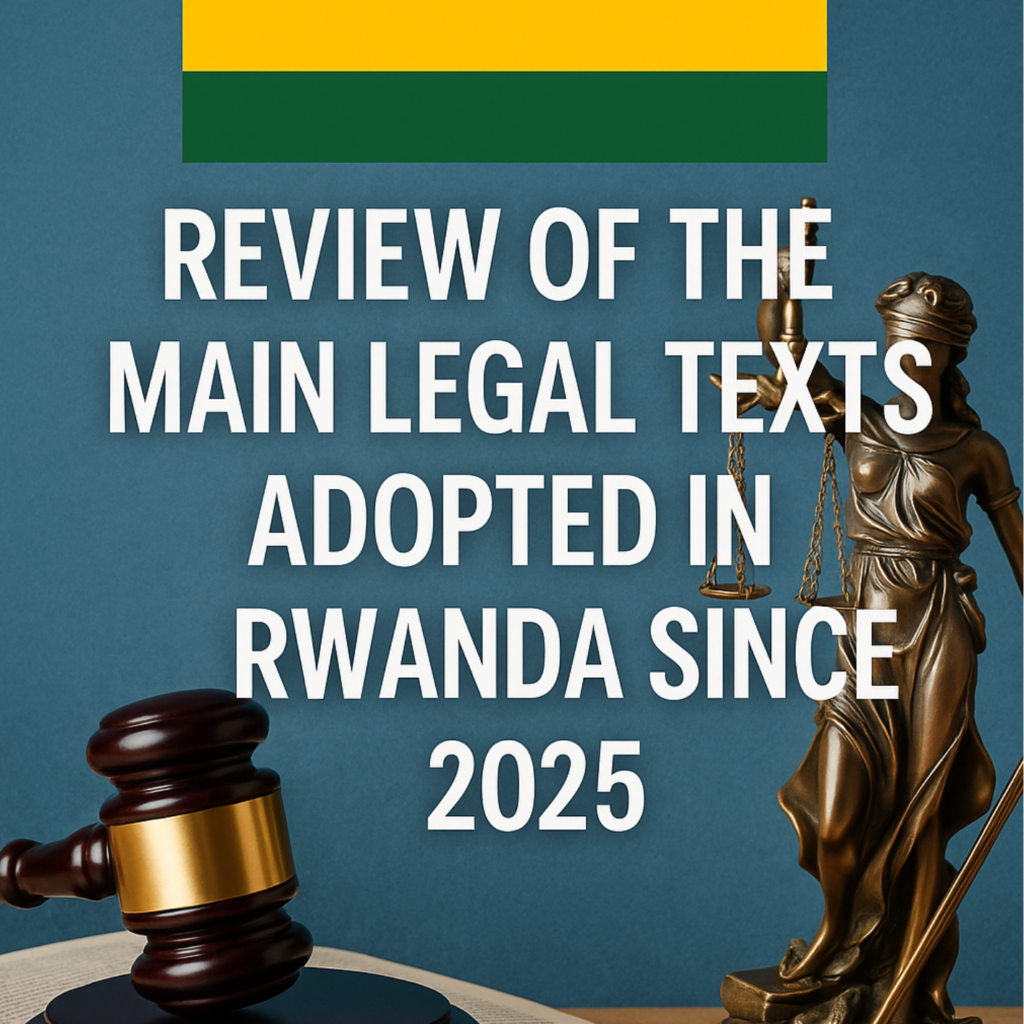Since 2025, Rwanda has continued its legislative modernization efforts to strengthen its institutional, economic, social, and security frameworks. The reforms adopted cover a wide range of sectors, including public administration, justice, financial governance, taxation, environment, national defense, territorial planning, and the regulation of faith-based and financial organizations.
1. GOVERNANCE, PUBLIC ADMINISTRATION, AND INSTITUTIONS
Several new legal instruments have redefined the organization of public bodies and staff statutes, notably:
- The reorganization of the Refugees and Asylum Seekers Appeal Tribunal;
- The special statute governing staff of public higher learning institutions and the Rwanda Atomic Energy Board;
- The organization of Rwanda Polytechnic;
- The regulations guiding faith-based organizations;
- The procedural framework on plea-bargaining, reflecting the modernization of judicial practices.
These reforms aim to enhance governance efficiency, improve professionalism in public service, and strengthen the legal framework for regulated entities.
2. JUSTICE, SECURITY, AND NATIONAL PROTECTION
Rwanda has enacted structural measures in national security and the fight against financial crime, including:
- The Law on the Prevention and Punishment of Money Laundering and the Financing of Terrorism;
- The Prime Minister’s Order establishing the National Counter-Terrorism Committee;
- The Presidential Order ratifying the Peace Agreement between Rwanda and the Democratic Republic of Congo (Washington, June 27, 2025).
These instruments reflect a proactive and internationally aligned security policy.
3. FINANCIAL SECTOR AND TAXATION
Fiscal and financial reforms have played a key role, including:
- The Law governing the Central Securities Depository and Qualified Financial Contracts;
- Updated regulations on foreign exchange and bank credit classification;
- Fiscal reforms covering:
- Excise duties,
- Value Added Tax (VAT),
- Income tax,
- Petroleum levy,
- Environmental tax on imported plastic packaging,
- Tourism tax on accommodation.
These measures aim to strengthen public revenue mobilization, promote fiscal discipline, and ensure transparency in financial markets.
4. URBAN PLANNING, ENVIRONMENT, AND LAND MANAGEMENT
As part of the National Strategy for Transformation (NST1), several texts on spatial planning and environmental protection were enacted, including:
- Master Plans for the districts of Ngoma, Rulindo, Rwamagana, Musanze, and Gakenke;
- The Ministerial Order on air pollutant emissions;
- The regulatory framework for activities involving Living Modified Organisms (biotechnology).
These norms promote controlled, sustainable urbanization aligned with emerging technologies.
5. SOCIAL PROTECTION AND CIVIL ADMINISTRATION
Key innovations include:
- The increase of pension and occupational hazard benefits;
- The reform of civil status registration procedures;
- The determination of conditions for the emancipation of minors.
These measures reinforce social protection, civil rights recognition, and administrative efficiency.
6. TRANSPORT AND TRADE
Ministerial Orders have modernized:
- Vehicle registration and taxation procedures for imported and already registered vehicles;
- VAT exemptions for certain financial services;
- The reward mechanism linked to VAT compliance.
CONCLUSION
The year 2025 stands as a pivotal regulatory milestone for Rwanda, reflecting a vision grounded in good governance, international integration, financial stability, modern territorial planning, and a strengthened fiscal framework. Together, these reforms are expected to enhance investor confidence, legal certainty, and the overall efficiency of public administration.


